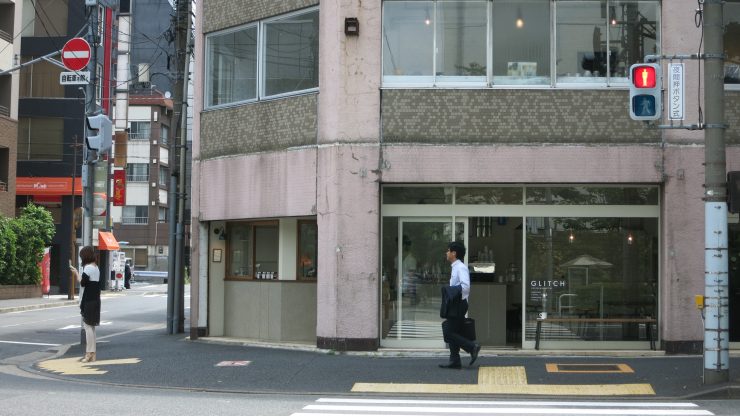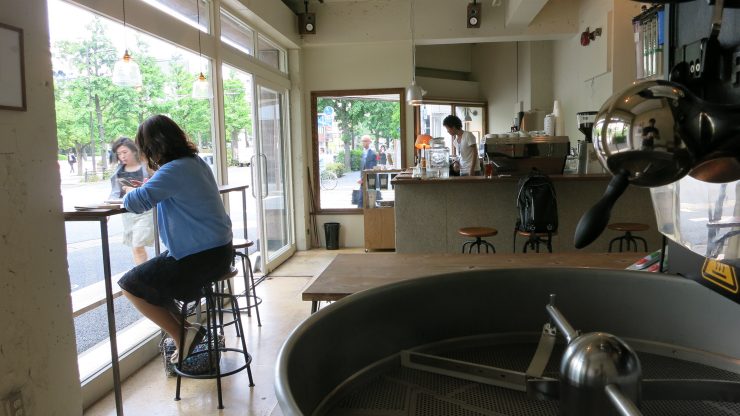Located in Jimbocho, Kanda, Glitch Coffee sits on a quiet street corner—a five minute walk from the train station. It opened on April 10th, earlier this year, and yet somehow it feels like it’s always been there—the white brick interior, the simple wooden counter, the take-out window and pour-over setup, the Aretha Franklin wafting out into the street; it’s all soaked in a comfortable, lived-in vibe.
There’s history here in Jimbocho; once a haven for university students and intellectuals, time saw it grow into Tokyo’s haven for used books. Here, old tomes collect in aging shops overflowing with bundled books on dusty shelves, all of it rich with the scent of faded history. It’s a far cry from the more trendy, bustling, and youth-driven neighborhoods of Tokyo, but that’s exactly the point, says owner and barista Kiyokazu Suzuki.
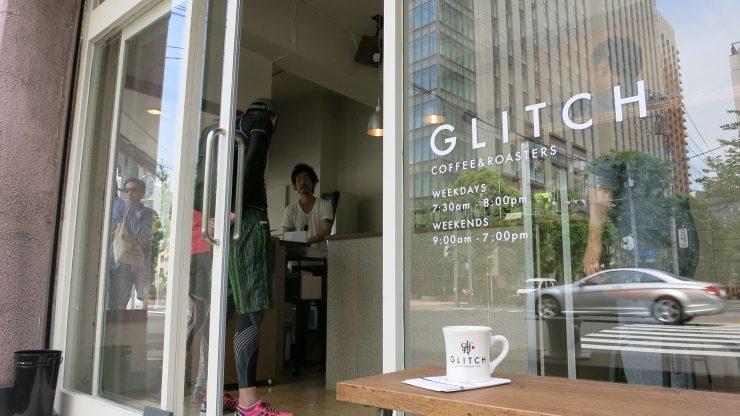
“Jimbocho isn’t a Shinjuku or a Shibuya,” Suzuki tells me. “It’s not the kind of place that will ever be a New York City—but it’s a place that hasn’t changed much over the years. The old bookstores are still here, the old-style Japanese food is still famous, the Imperial Palace and Yasukuni Shrine are nearby—there’s tradition.”
Culture, tradition, history—it’s that connection to the past as a step into the future that seems to strike a chord with Suzuki. “I thought if I wanted to start a place, this was the kind of place I wanted to try—it has meaning to me,” he says. “It’s about respect for our history. It’s not as much about whether we can sell our coffee or not. It’s about the meaning.”
It’s an intriguing motivation, and one that stems from Suzuki’s long winding path to find the perfect marriage of career and lifestyle.
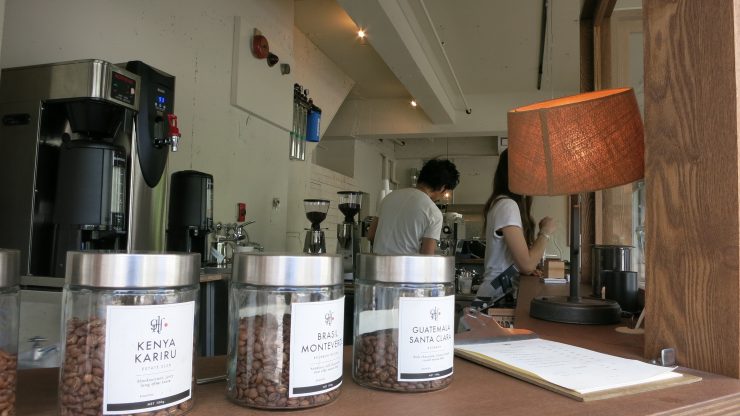
Suzuki says he knew after his first year as a salaryman that the lifestyle didn’t fit—that the nine to five, the overtime, the suit and tie, and the daily office grind were things he couldn’t imagine doing until retirement. He was hungry for something more fitting, and this feeling kickstarted a four-year journey of discovery—a time in which Suzuki tried his hand at anything and everything that sparked his interest.
Pottery, stained glass windows, silver accessories, t-shirt design, cars—Suzuki tried it all, and along the way discovered coffee.
“I realized that coffee is very compatible,” he says. “It fits with almost anything. I was really into ceramics and pottery at first, so I thought maybe I could do that together with coffee. I considered the same thing with a car workshop—that I could do it with a cafe.”
But the further down the coffee rabbit hole Suzuki went, the more he was entranced by the depth he found—the differences in source location, brewing methods, roasting varieties—and the more it came to be his focus. There was something appealing in the complexity of it all, the skill involved in making it work, and the way it was a smooth entry point to connection and communication.
After working for a number of different coffee shops, he eventually found himself at Paul Bassett, where he honed his craft as barista trainer and head roaster, along the way picking up first place in the Japan AeroPress Championship in 2014.
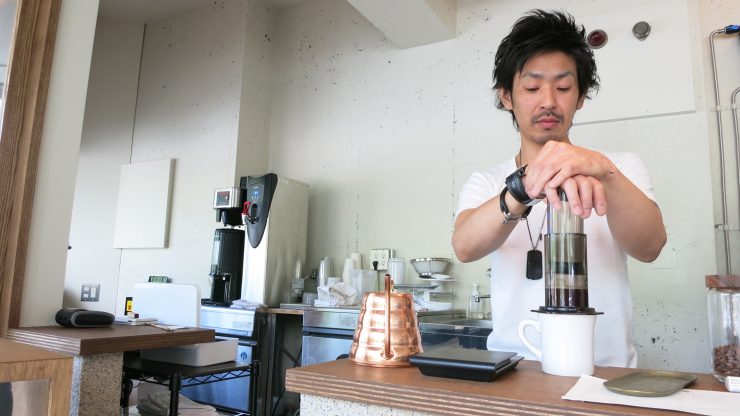
But through it all, Suzuki always felt a pull to start his own place, and do his own thing. The birth of Glitch Coffee, in this sense, is an extension of Suzuki’s ideas about career and lifestyle.
“Work and lifestyle should be in harmony,” he tells me. “That’s really important to me. Wearing a suit to the office and working as a salaryman until 65—it just wasn’t me; I couldn’t imagine being happy. But at a cafe, I can wear what I want, and be who I am—my personality is in my work.”
It’s when I hear Suzuki talk about it that I notice the subtle ways his personality colors the shop, from the choice of music and the simple, open store layout, to the lighting, the choice of beans, and, of course, the coffee service. It’s casual, but considerate, and at times excited and energetic—particularly if you ask about Kenyan coffees, Suzuki’s personal favorite.
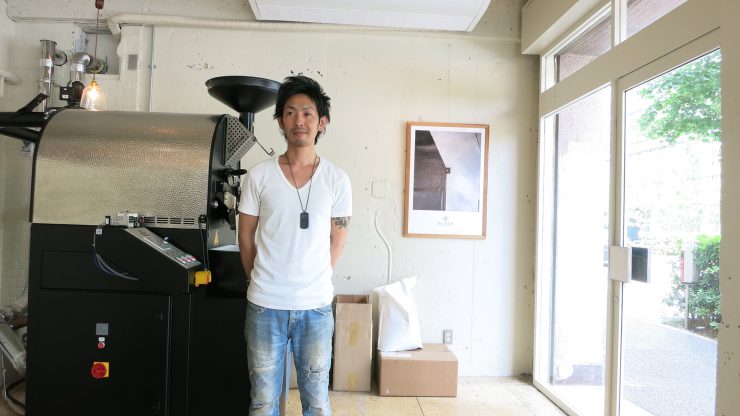
The decision to open Glitch came as a chance to see new projects take flight, and to improve coffee in Japan. Suzuki talks of finding new ways to express what his country is doing with coffee, and sharing it with the world.
“Blue Bottle were initially inspired by Japanese coffee, and then they took it back to the States—that was an inspiration for them, and now it’s like a reverse import to Japan. Other famous international names are popping up here too, and I have a lot of respect for all of them. At the same time, I feel like it’s about time for Japan to take the next step forward.”
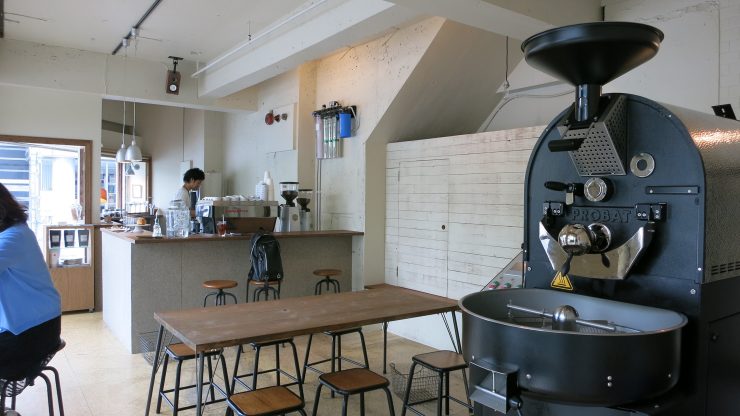
He went on: “I thought about it a lot. And I don’t want to just talk or think about it. Opening my own place and putting out my own coffee means I can help start a movement towards new, better coffee for Japan—something we can share with the world. I really feel strongly about that.”
The roaster too is the start of what Suzuki calls a “shared roaster project”: a chance for smaller cafes to roast their own beans, find their own particular tastes, and work with Glitch Coffee to gather data, develop, and improve. It’s this idea of experimenting towards new tastes and new flavor experiences that is at the heart of the name “Glitch”. Suzuki says it’s the glitches in the process where the surprise discoveries lay—it’s in the accidents along the way that delicious new flavors await. The name works as a reminder to be open minded in the face of the unexpected.
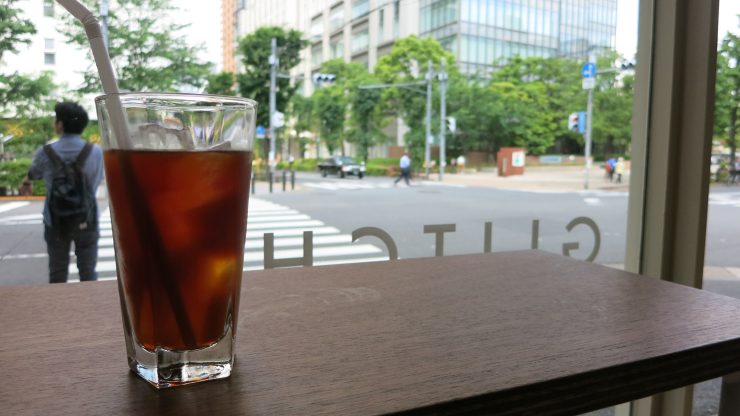
Perhaps just a simple cafe-roaster on the face of it, at its core Glitch Coffee is a reminder that life is about the paths we choose to walk, the ways we choose to walk them, and the discoveries we make along the way. It’s about finding who you are through what you do, and balancing a reverence for the past with an eye for the future.
Glitch Coffee is located at 3 Chome-16, Kanda-Nishikicho, Chiyoda, Tokyo.
Hengtee Lim (@Hent03) is a Sprudge.com staff writer based in Tokyo. Read more Hengtee Lim on Sprudge.
The post Walking The Path To Glitch Coffee In Jimbocho, Tokyo appeared first on Sprudge.


